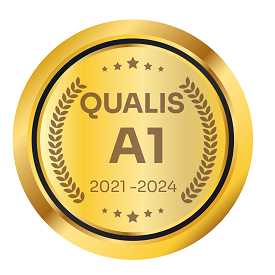Educación y antropomorfismo en el lenguaje a través del lente de encarnación
DOI:
https://doi.org/10.22633/rpge.v25iesp.7.16184Palabras clave:
Encarnación, Semántica, Metáfora, Estructura semántica de la palabra, Sistema educativo, Invariante léxicoResumen
La lingüística cognitiva enfatiza la importancia de considerar el fenómeno de la “corporeización” a través del prisma del estudio del papel central del cuerpo humano, las correspondientes estructuras antropomórficas cognitivas y lingüísticas, y su influencia en la construcción del significado del mundo por parte del hombre. En el ámbito del artículo se demostró con el material de la estructura léxica de la palabra polisemántica brazo que la estructura y funcionamiento del cuerpo humano predeterminan los aspectos vitales de nuestro pensamiento, verbalización y existencia en general. La invariante léxica de esta palabra polisemántica se define como un conjunto de características dominantes que subyacen en los significados metafóricos figurativos de esta palabra que pueden ser considerados como parte de nuestro sistema educativo. La descripción del funcionamiento del cuerpo humano se proyecta sobre objetos abstractos, concretos y fenómenos ambientales que nos rodean.
Descargas
Citas
BENLIAN, A.; KLUMPE, J.; HINZ, O. Mitigating the intrusive effects of smart home assistants by using anthropomorphic design features: A multimethod investigation. Information Systems Journal, v. 30, n. 6, p. 1010-1042, 2020.
BONNET, C. et al. Mapping ancient gods: naming and embodiment beyond “anthropomorphism”. A survey of the field in echo to the books of MS Smith and R. Parker. Mediterranean Historical Review, v. 34, n. 2, p. 207-220, 2019.
CARSTAIRS-MCCARTHY, A. The origins of complex language: an inquiry into the evolutionary beginnings of sentences, syllables and truth. Oxford: Oxford University Press, 1999.
FREGE, G. Selected Works. Moscow: Nauka, 1997.
GHIGLINO, D. et al. Mind the eyes: artificial agents’ eye movements modulate attentional engagement and anthropomorphic attribution. Frontiers in Robotics and AI, v. 8, 2021.
GIVON, T. Bio-linguistics: The Santa Barbara Lectures. John Benjamins Publishing, 2002.
KRAVCHENKO, А. V. Cognitive Linguistics Today: Integration Processes and the Problem of the Method. Issues of Cognitive Linguistics, p. 37–52. 2004.
LAKOFF, G. Women, fire and dangerous things: what categories reveal about the mind. Chicago: University of Chicago Press, 1987.
LICHTENBERG, S. et al. Let us work Together'–Insights from an Experiment with Conversational Agents on the Relation of Anthropomorphic Design, Dialog Support, and Performance. 2021.
LUNBERRY, D.; LIEBENAU, J. Human or machine? A study of anthropomorphism through an affordance lens. In: Digital Transformation and Human Behavior. Springer, Cham, 2021. p. 201-215.
MATURANA, H. The Biology of Cognition. Language and intelligence. Moscow: Progress, 1996. 416 p.
MOUSSAWI, S.; KOUFARIS, M.; BENBUNAN-FICH, R. How perceptions of intelligence and anthropomorphism affect adoption of personal intelligent agents. Electronic Markets, p. 1-22, 2020.
OCCHI, D. J. Where Japanese and Occidental Cultural Conceptualisations Meet: Reading Manga Which Anthropomorphise Nations as Kyara ‘Characters’ Through the Lens of Cultural Linguistics. In: Advances in Cultural Linguistics. Springer, Singapore. 2017. p. 561-572.
PESINA, S. A. et al. Functioning of polysemantic words in the lexicon. Applied Linguistics Research Journal, v. 4, n. 9, p. 64-69, 2020; Available: https://jag.journalagent.com/alrj/pdfs/ALRJ_4_9_64_69.pdf. Access: 15 June 2020.
PESINA, S. A.; ZIMAREVA, O. L. Semantic analysis and representation of meanings in the structure of polysemous words. Voprosy Kognitivnoy Lingvistiki. Tambov: TGU, v. 1, n. 50, p. 146-154, 2017. [in Russian]. Available: http://www.vcl.ralk.info/issues/2017/_1_2017/semanticheskiy_analiz_i_reprezentatsiya_znacheniy_v_strukture_mnogoznachnykh_slov.html. Access: 15 June 2020.
PESINA, S. A.; ZIMAREVA, O. L.; VTORUSHINA, YU. L. The use of cluster approach to the description of the word semantics for the formation of the lexical competence of bachelor's students of the linguistic field. Perspectives of Science and Education, v. 1, n. 37, p. 445-454, 2019. Available: https://pnojournal.wordpress.com/2019/02/25/pesina-zimareva-vtorushina/. Access: 15 June 2020.
PESINA, S.; TIMOKHINA, E.; VTORUSHINA, J.; PULEKHA, I. Lexical knowledge representation and semantic structure of a word. The European Proceedings of Social and Behavioural Sciences. V. 98. In: Joint Conferences: 20th PCSF and 12th CSIS-2020 20th conference Professional Culture of the Specialist of the Future 12th conference Communicative Strategies of Information Society. European Publisher, 2020. p. 562-570. Available: https://www.europeanproceedings.com/article/10.15405/epsbs.2020.12.03.56. Access: 15 June 2020.
SILVERMAN, B. B. L. M. Fursonas: furries, community, and identity online. 2020. Dissertation (Doctoral) – Massachusetts Institute of Technology, 2020.
SOLONCHAK, T.; PESINA, S. Language Ability and Word Functioning. Procedia - Social and Behavioral Sciences, v. 192, p. 447–452, 2015. Available: https://core.ac.uk/download/pdf/82217182.pdf. Access: 15 June 2020.
TANDON, P.; PESINA, S. А.; PULEKHA, I. R. Peculiarities of Understanding of English Thematic Discourse. Humanities and Pedagogy Research, v. 3, n. 1, p. 79-84, 2019. Available: http://gpi.magtu.ru/images/doc/2019-1.pdf. Access: 15 June 2020.
TIPPETT, S. J. Evaluating Samuel Beckett’s visual stage language: viewing the aesthetic of failure through the lens of visual art. 2020. Dissertation (Doctoral) – Kingston University, 2020.
VITTGENSTEIN, L. Philosophical Works. Мoscow: Gnosis, 1994.
Publicado
Cómo citar
Número
Sección
Licencia
Derechos de autor 2022 Revista on line de Política e Gestão Educacional

Esta obra está bajo una licencia internacional Creative Commons Atribución-NoComercial-CompartirIgual 4.0.
Manuscritos aceitos e publicados são de propriedade da Revista on line de Política e Gestão Educacional. É vedada a submissão integral ou parcial do manuscrito a qualquer outro periódico. A responsabilidade do conteúdo dos artigos é exclusiva dos autores. É vedada a tradução para outro idioma sem a autorização escrita do Editor ouvida a Comissão Editorial Científica.











